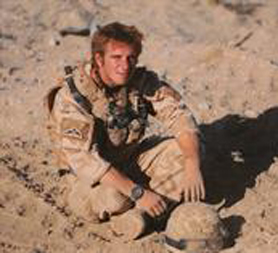IED combat under scrutiny at Olaf Schmid inquest
 Alex Thomson
Chief Correspondent
Alex Thomson
Chief Correspondent
Channel 4 News examines the deadly threat of IED attacks for British troops in Afghanistan as Jane Deith reports from the inquest into the death of Olaf Schmid, a bomb disposal victim in 2009.

If one weapon has characterised the Afghan conflict it is the use by the Taliban of IEDs (Improvised Explosive Device).
The varied explosive devices are to blame for thousands of the wounded in Afghanistan. In 2010 alone IED related injuries accounted for over 60 per cent of those suffered by U.S. troops throughout the whole conflict.
Although official figures for servicemen employed as Explosive Ordinance Disposal (EOD) Operators has not been released by the Ministry of Defence it is believed to have increased two-fold as the use of IEDs has vastly escalated.
Charles Heyman, editor of Armed Forces UK, told Channel 4 News: “It is safe to say that the number of EOD operators on the ground has doubled in the last two years.”
In 2010 insurgents planted a total of 14,661 explosive devices, a 62 per cent increase on 2009 and a comparable year-on-year rise going back to 2003 when only 81 devices were discovered. The escalating number of IED weapons present has led to the training of local Afghan police into an Explosive Hazard Prevention Team.
Mr Hayman admitted that he had spoken to soldiers who “can no longer patrol along the streets and have to patrol from roof to roof”.
Channel 4 News has investigated the impact of the IED extensively, not least the effect it has on the soldiers challenged to combat them.
Channel 4 News special report – Afghanistan: taking on the Taliban
In February last year, Captain Jon Evett spoke of how “the soldiers need to be one step ahead at all times in a game where there are no winners, only those who survive“.
Chief Correspondent Alex Thompson experienced first hand the challenges faced by the EOD operator day-in-day out: IEDs: the invisible enemy
This intense pressure is a sentiment that Charles Hayman was keen to re-inforce: “For every 60 IEDs diffused on a tour there could be three times as many false alarms, but each are as scary as the next one”.
Stories of incredible valour from bomb disposal experts have become commonplace in the Afghan conflict. Staff Sergeant Kim Hughes was awarded the George Cross after diffusing 80 devices during a six month tour.
He spoke candidly about the length of tours and exhaustion caused for the book Bomb Hunters: “At the end of the tour we were all completely knackered. Six months is a long time for what we do in Afghanistan. We were all exhausted. I’d say it (six months) was too long; four months would be about right.”
This pressure on soldiers is one of the major aspects of the inquest into Olaf Schmid’s death after an IED blast in 2009. Re-opening on Wednesday, the court heard about the growing stress the tour had put on Mr Schmid before the fatal incident on his final day of duty before he was due to return to his family in the UK.
Security in Afghanistan is believed to have improved over the last few months since more US soldiers arrived, but Mr Heyman said that he believes this to be a consequence of the Taliban knowing coalition troops are due to leave in 2014. However, he thinks the Taliban will keep the level of IEDs up to maintain the pressure on British Armed Forces.
Jane Deith reports from the Olaf Schmid inquest
An inquest into the death of bomb disposal expert Staff Sgt Olaf Schmid who was killed in Afghanistan has heard was "rushed" the day he died.
Staff Sgt Schmid, from Truro in Cornwall, died disarming a roadside bomb in Helmand in November 2009. His widow Christina accepted the George Cross on his behalf in a ceremony last year.
The 30-year-old soldier, died the day before he was due to return to the UK after making safe 64 devices.
Today the Coroner in Truro read out a statement from Sapper Craig Butterworth who was with Staft Sgt Schmid while he was preparing to disable several suspected improvised explosive devices - or IEDs.
Sapper Butterworth said Schmid seemed "slightly rushed" - he thought that was because it was their "last stop" before coming home to the UK on leave.
He said he saw Staff Sgt Schmid working on an IED in a way he'd never seen before; he said that when Olaf Schmid found a command wire, he traced it by hand instead of using a plastic hand held device:
"He began to follow the wire himself, by lifting it out of the ground by hand, and cutting it every so often. I remember him saying 'You didn't see me do this'.
Staff Sgt Schmid was working to attach a control wire to the device but it exploded before the controlled explosion. He was killed instantly.
In his statement Sapper Craig Butterworth paid tribute to Staff Sgt Schmid: "He was an inspiration to me and the team. He was a total professional and a good man and whoever replaces him has some big shoes to fill."
Channel 4 News reporter Jane Deith is at the inquest of Staff Sgt Olaf Schmid in Truro and updating developments on Twitter. Follow her @janedeithC4




